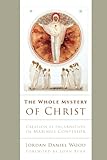The whole mystery of Christ : Creation as Incarnation in Maximus Confessor / Jordan Daniel Wood ; foreword by John Behr.
Material type: TextPublisher: Notre Dame, Indiana : University of Notre Dame Press, 2024Copyright date: ©2022Description: xxv, 356 pagine ; 23 cmContent type:
TextPublisher: Notre Dame, Indiana : University of Notre Dame Press, 2024Copyright date: ©2022Description: xxv, 356 pagine ; 23 cmContent type: - testo (txt)
- senza mediazione (n)
- volume (nc)
- 9780268203481
- 9780268203474
- 232.1 23
- BR65.M416 W663 2022
- BQ 1614.W66 2022
| Item type | Current library | Call number | Status | Barcode | |
|---|---|---|---|---|---|
 Opera (Magaz.)
Opera (Magaz.)
|
Biblioteca "Angelicum" Pont. Univ. S.Tommaso d'Aquino Temporary Library | BQ 1614.W66 2022 (Browse shelf(Opens below)) | Available | 0030221783 |
Browsing Biblioteca "Angelicum" Pont. Univ. S.Tommaso d'Aquino shelves, Shelving location: Temporary Library Close shelf browser (Hides shelf browser)

|

|

|

|

|

|

|
||
| BQ 1614.E5.2014-1 On difficulties in the Church fathers : the Ambigua / | BQ 1614.L68 Maximus the Confessor / | BQ 1614.O95 2015 The Oxford handbook of Maximus the Confessor / | BQ 1614.W66 2022 The whole mystery of Christ : Creation as Incarnation in Maximus Confessor / | BQ 1666.I7.O76-9/3b Omelie sui Salmi : Codex Monacensis Graecus 314 / | BQ 1666.I7.O76-20 Esortazione al martirio / | BQ 1669.G68E.2018-1 The commentary of Origen on the Gospel of St Matthew / |
Bibliografia (pagine 333-350) e indice.
The God-world relation in modern Maximus scholarship -- The middle: Christo-logic -- The beginning: word becomes world -- The end: world becomes Trinity -- The whole: creation as Christ -- The whole mystery of Christ.
"Jordan Daniel Wood changes the trajectory of patristic scholarship with this comprehensive historical and systematic study of one of the most creative and profound thinkers of the patristic era: Maximus Confessor (560-662 CE). Wood's panoramic vantage on Maximus's thought emulates the theological depth of Hans Urs von Balthasar's Cosmic Liturgy while also serving as a corrective to that classic text. Maximus's theological vision may be summed up in his enigmatic assertion that 'the Word of God, very God, wills always and in all things to actualize the mystery of his Incarnation.' The Whole Mystery of Christ sets out to explicate this claim. Attentive to the various contexts in which Maximus thought and wrote--including the wisdom of earlier church fathers, conciliar developments in Christological and Trinitarian doctrine, monastic and ascetic ways of life, and prominent contemporary philosophical traditions--the book explores the relations between God's act of creation and the Word's historical Incarnation, between the analogy of being and Christology, and between history and the Fall, in addition to treating such topics as grace, deification, theological predication, and the ontology of nature versus personhood. Perhaps uniquely among Christian thinkers, Wood argues, Maximus envisions creatio ex nihilo as creatio ex Deo in the event of the Word's kenosis: the mystery of Christ is the revealed identity of the Word's historical and cosmic Incarnation".


